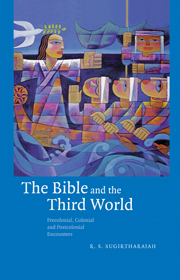Crossref Citations
This Book has been
cited by the following publications. This list is generated based on data provided by Crossref.
Frankiel, Tamar
2003.
The cross-cultural study of Christianity: An historian's view.
Religion,
Vol. 33,
Issue. 3,
p.
281.
Engelke, Matthew
2004.
Text and performance in an African church: The Book, “live and direct”.
American Ethnologist,
Vol. 31,
Issue. 1,
p.
76.
Ringma, Charles
2004.
Holistic Ministry and Mission: A Call for Reconceptualization.
Missiology: An International Review,
Vol. 32,
Issue. 4,
p.
431.
Yamada, Frank M.
2004.
Derrida’s Bible.
p.
119.
Sugirtharajah, R. S.
2005.
The Bible and Empire.
Kumar, Navneet
2006.
The Native Discursive Insurgency inThe Varthamanappusthakam.
South Asian Review,
Vol. 27,
Issue. 2,
p.
190.
Latvus, Kari
2006.
The Postcolonial Biblical Reader.
p.
186.
Adamo, David
2007.
Decolonizing the Psalter in Africa.
Black Theology,
Vol. 5,
Issue. 1,
p.
20.
Israel Selvanayagam
2008.
Christian Theology in Asia.
p.
41.
Lee, Archie C. C.
2008.
Christian Theology in Asia.
p.
179.
Wright, T. John
2009.
International Handbook of the Religious, Moral and Spiritual Dimensions in Education.
Vol. 1,
Issue. ,
p.
525.
Stolow, Jeremy
2010.
The New Blackwell Companion to the Sociology of Religion.
p.
544.
Yee, Gale A.
2010.
Methods for Exodus.
p.
193.
Israel, Hephzibah
2010.
Some Challenges for Scholarship on Protestant Translations of the Bible: The Tamil Context.
Religion Compass,
Vol. 4,
Issue. 2,
p.
99.
2011.
Exploring Postcolonial Biblical Criticism.
p.
188.
Powery, Emerson B.
2011.
‘Rise Up, Ye Women’.
Postscripts: The Journal of Sacred Texts, Cultural Histories, and Contemporary Contexts,
Vol. 5,
Issue. 2,
p.
171.
Adamo, David T.
2011.
Christianity and the African traditional religion(s): The postcolonial round of engagement.
Verbum et Ecclesia,
Vol. 32,
Issue. 1,
Kim, Grace Ji-Sun
2011.
The Holy Spirit, Chi, and the Other.
p.
63.
Kim, Grace Ji-Sun
2011.
The Holy Spirit, Chi, and the Other.
p.
117.
Kim, Grace Ji-Sun
2011.
The Holy Spirit, Chi, and the Other.
p.
91.



